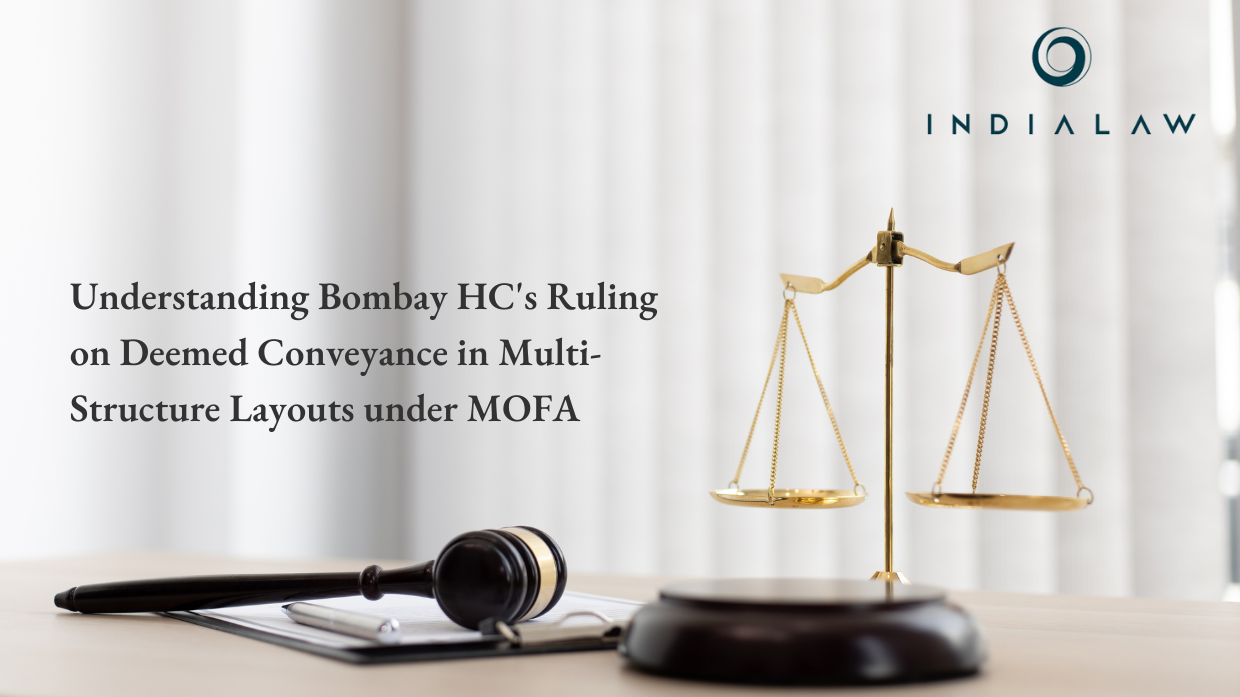Deciphering Legal Complexities: Bombay High Court’s Ruling on Deemed Conveyance in Multi-Structure Large Layout Developments under MOFA

Introduction:
The judgment titled “Marathon Era v The Competent Authority & Ors and Gulmohar Lokmilan CHSL & Anr v The Competent Authority & Ors” navigates the intricate legal terrain concerning the conveyance of properties within multi-building layouts governed by the Maharashtra Ownership Flats (Regulation of the Promotion of Construction, Sale, Management and Transfer) Act, 1963 (“MOFA”). This case involves two distinct writ petitions, each addressing similar issues but from different perspectives.
The first Writ Petition, filed by Marathon Era Cooperative Housing Society, is instituted upon rejection of its application under Section 11 of MOFA, seeking unilateral deemed conveyance by the Competent Authority. Marathon Era seeks legal recourse, disputing the Competent Authority’s decision and advocating for the conveyance of land, built-up area, and common areas to the respective societies within the layout upon completion of individual buildings.
The second Writ Petition, preferred by Gulmohar Lokmilan Cooperative Housing Society, challenges the order granting unilateral deemed conveyance to other societies within the layout. Gulmohar Lokmilan asserts its entitlement to participation and rights in the layout development process, contending that it was unjustly excluded from the conveyance process.
Both Writ Petitions highlight the complexities inherent in multi-building layout developments, where cooperative housing societies vie for their rightful share of conveyance rights as per the provisions of MOFA. The High Court’s examination of these petitions aims to elucidate the legal framework governing conveyance rights in such scenarios, ensuring equitable resolution and adherence to statutory requirements.
Facts of the Case:
- Marathon Era Cooperative Housing Society Writ Petition:
- Marathon Era Cooperative Housing Society, the petitioner, is a cooperative housing society situated within a multi-building layout.
- The dispute arises from Marathon Era’s application for unilateral deemed conveyance, seeking the transfer of land, built-up area, and common areas to the respective societies within the layout.
- The Competent Authority, responsible for adjudicating such matters, rejected Marathon Era’s application, resulting into filing of Writ Petition challenging this decision.
- Marathon Era contends that upon the completion of individual buildings within the layout, the developer should convey the land, built-up area, and common areas to the respective societies as per the provisions of MOFA.
- The Petitioner Marathon Era emphasizes its entitlement to a share of the conveyance rights and argues against the Competent Authority’s decision to deny the unilateral deemed conveyance.
- Gulmohar Lokmilan Cooperative Housing Society Writ Petition:
- Gulmohar Lokmilan Cooperative Housing Society, the petitioner, is another cooperative housing society.
- This writ petition challenges an order granting unilateral deemed conveyance to other societies within the layout, excluding Gulmohar Lokmilan from the conveyance process.
- Gulmohar Lokmilan highlights discrepancies in the conveyance process and disputes the validity of the order issued by the Competent Authority.
Contentions by both sides:
Marathon Era Cooperative Housing Society Writ Petition:
Contentions by Marathon Era Cooperative Housing Society:
- Marathon Era contends that once society was formed and Occupational Certificate was obtained, the developer is obligated to convey the land, built-up area, and common areas to the respective societies and if not done voluntarily, conveyance can be mandated as per Section 11 of the MOFA.
- The Petitioner emphasizes its entitlement of conveyance rights of is not only to the building but also of the land appurtenant, as per the Maharashtra Ownership Flats (Regulation of the Promotion of Construction, Sale, Management and Transfer) Act, 1963 (MOFA).
- Marathon Era asserts that the Competent Authority erred in rejecting its application for unilateral deemed conveyance, arguing that such conveyance is essential for the orderly development and management of the layout.
- The society highlights the developer’s obligations under MOFA to facilitate the conveyance process and ensure the transfer of ownership rights to the respective societies within the layout.
Contentions by the Developer/Owner (Marathon NextGen Realty Pvt. Ltd.):
- The developer/owner argues that MOFA is not applicable to multi-building layouts as Maharashtra Housing (Regulation and Development) Act, 2012 (“MHRD Act”) impliedly repeals MOFA.
- The developer contends that the repeal provision in the MHRD Act was never notified and that the subsequent repeal of the MHRD Act by the Real Estate (Regulation and Development) Act, 2016 (RERA) does not imply a revival of MOFA.
- The developer opposes the application for unilateral deemed conveyance, disputing the petitioner’s interpretation of statutory provisions and asserting the legality of its actions regarding the conveyance process within the layout.
Gulmohar Lokmilan Cooperative Housing Society Writ Petition:
Contentions by Gulmohar Lokmilan Cooperative Housing Society:
- Gulmohar Lokmilan challenges the order granting unilateral deemed conveyance to other societies within the multi-building layout while excluding Gulmohar Lokmilan from the conveyance process on the basis of a private surveyor’s plan.
- The petitioner disputes its exclusion from the conveyance and asserts its rights to participate in and benefit from the conveyance process as per the statutory provisions.
- Gulmohar Lokmilan highlights discrepancies in the conveyance process and raises concerns regarding the validity and fairness of the order issued by the Competent Authority.
Contentions by the Competent Authority and Other Societies:
- The Competent Authority and the other societies involved in the conveyance process argue in favour of the order granting unilateral deemed conveyance, excluding Gulmohar Lokmilan as the said society was not a part of the layout.
- They contend that the conveyance process was conducted in accordance with the applicable laws and regulations, and the exclusion of Gulmohar Lokmilan was justified based on the specific circumstances and agreements governing the layout development.
- The respondents maintain that the order issued by the Competent Authority was legally sound and aligned with the principles of fairness and equity.
Observations of the High Court:
Marathon Era Cooperative Housing Society Writ Petition:
The High Court examined the applicability of the Maharashtra Ownership Flats (Regulation of the Promotion of Construction, Sale, Management and Transfer) Act, 1963, the Maharashtra Housing (Regulation and Development) Act, 2012, and the Real Estate (Regulation and Development) Act, 2016 (“RERA”). It observed that while the MHRD Act impliedly repealed MOFA, the subsequent repeal of the MHRD Act by section 92 of RERA did not revive MOFA due to the non-notification of the MHRD Act’s repeal provision. The High Court clarified the legal framework governing multi-building layouts and the obligations of developers under MOFA and other relevant statutes.
The Court assessed the petitioner’s application for unilateral deemed conveyance and the Competent Authority’s decision to reject it. It acknowledged the petitioner’s entitlement to certain conveyance rights but found flaws in the application’s formulation and compliance with statutory provisions. The court highlighted the Competent Authority’s jurisdiction regarding interpretation of statute in evaluating conveyance applications. The High Court also laid emphasis on the Government Resolution dated 22nd June 2018, intended to streamline the conveyance process. The High Court dismissed the Writ Petition but granted the petitioner leave to file a fresh application for conveyance, subject to compliance with legal standards. It directed the Competent Authority to consider the fresh application independently and in accordance with the law, without being influenced by previous orders or judgments.
Gulmohar Lokmilan Cooperative Housing Society Writ Petition:
The court examined the petitioner’s contention regarding its exclusion from the conveyance process and the grant of unilateral deemed conveyance to other societies. It noted discrepancies in the conveyance process and concerns regarding fairness and equity in the Competent Authority’s decision. The High Court quashed the order granting unilateral deemed conveyance and remanded the matter to the Competent Authority for fresh consideration. It highlighted the Competent Authority’s failure to provide adequate reasoning for the exclusion of Gulmohar Lokmilan. The court emphasized the importance of procedural fairness and the need for a thorough examination of all relevant factors in conveyance decisions. It underscored the Competent Authority’s obligation to adjudicate conveyance applications impartially and in accordance with statutory provisions and established legal principles.
Conclusion:
The ruling by the Bombay High Court on the issue of “Unilateral Deemed Conveyance” within multi-structure large layout developments, as governed by the Maharashtra Ownership Flats Act (MOFA), sheds light on the intricate legal and practical challenges inherent in such scenarios. The case, prompted by petitions from housing societies like Marathon Era Co-operative Housing Society Ltd and Gulmohar Lokmilan Cooperative Housing Society Limited, exemplifies the complexities arising from phased construction projects over extended periods.
One of the central complexities highlighted by the court is the difficulty in correlating the built-up area of individual buildings within a larger development with the overall Floor Space Index (FSI) allocated to the entire layout. Unlike in single-plot developments, where FSI allocation is straightforward, multi-structure projects involve internal allocations determined by promoters or developers, often without direct relation to specific land records. This disparity can lead to disputes over deemed conveyance rights, as evidenced by the petitions. The High Court observed that individual society shall have the right to use the common areas and amenities, however, the apex society/federation of the condominium of the Society shall have the actual title to the said common areas and other balance FSI.
Moreover, the court underscored the importance of ensuring that any additional FSI utilized does not compromise promised facilities and amenities to residents, reaffirming established legal principles. Additionally, once FSI is utilized in completed buildings, it cannot be compromised or reduced in any way, preserving the rights and entitlements of existing occupants.
By entering the email address you agree to our Privacy Policy.



